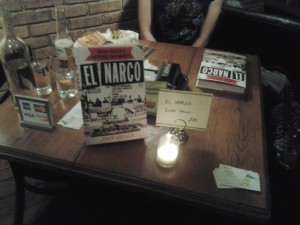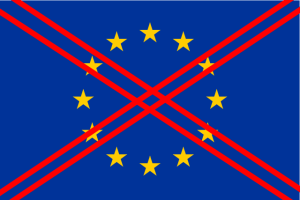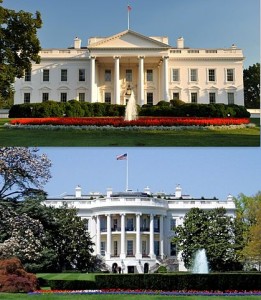
Last night I had the pleasure of attending the latest installment in the Half King’s weekly reading series. It’s only fitting that the guest of honor that evening was the intrepid English-born, Mexico City-based journalist Ioan Grillo, since the bar is owned by renowned journalist and documentarian Sebastian Junger. Junger is probably best known for his reporting from war zones, specifically Afghanistan, and there is a plaque in the bar honoring his former collaborator on the film Restrepo, the late English photojournalist Tim Hetherington. Mr. Grillo was there in order to share some anecdotes and observations related to his newly released book, El Narco, an in-depth analysis of the sociological and political reasons behind the rise of what he described as a “parallel state” built upon drug-financed and cartel-derived institutions inside of Mexico.
His talk was particularly timely, given a report just published in the Los Angeles Times which examines the connection between international banking institutions and those seeking to launder money from illicit sources within Mexico. The systemic nature of the narco problem, its global scope, and the duration of the fight against its symptoms-if not causes-was vividly illustrated by Grillo, who in an hour-long discussion ranged from the impact of drugs on his birthplace of Brighton, England, to the wholly ineffectual attempt to impound heroin being trafficked over the Mexican-American border through Operation Intercept, to the thirteen individuals that were intimately involved in this book, including five who contributed materially to its creation who were killed during or after the writing of El Narco.
Although the industry of trafficking drugs into the United States from Mexico has existed since Congress effectively prohibited the distribution and production of a wide range of heretofore legal opiates with the Harrison Act, the transformation of this somewhat lucrative trade in contraband into an over thirty billion dollar per annum “insurgencia,” a noun fraught with meaning, as Secretary of State Hillary Clinton has learned, is a story that requires a more holistic explanation, which Ioan Grillo attempts to provide in El Narco. Rather than focusing simply upon the horrific, heart-rending atrocities that we associate with Mexico from American media reports, Grillo digs deeper into what he describes as the “machinery of murder” by interviewing those who participate in it directly. He traces the arc of the “low intensity war” that has erupted in the decade since he’s been reporting from Mexico and which escalated with the 2006 decision by President Felipe Calderon to wage war against the cartels, a decision which has led to the loss of over 45,000 lives in the ensuing years.
Some of the more interesting things that the author discussed included the intimate link between Colombia, where much of the drugs that come into this country are produced, and Mexico, through which most of our illegal narcotics are smuggled. Not only is there practical cooperation between narcos in both countries, there has also been a wholesale Mexicanization of the most conspicuous aspects of the Colombian narco culture; from the endemic corruption of political parties on the take of cartels, to the ostentatious display of wealth by drug barons, to the advent of the sicario-a Colombian derivation of a Latin word for assassin that Mexicans know all too well-to the development of paramilitary wings of cartels posing as vigilantes, such as Matas Zetas, i.e. the “Zetas killers.”
The day-to-day lives of journalists in Mexico-and what they do and do not report-was another interesting subject that was addressed at some length. While the cartels have no problem with Grillo reporting on the idosyncracies of cartel members-such as the young assassin who also loves his Sony Playstation-identifying those responsible for specific murders is verboten and often punished by death, which is why domestic journalists often ommit the names of the cartels culpable for specific crimes-even when their identities are widely known.
The recommendations Grillo makes seem sensible enough, especially the concept of reconsidering the unrealistic nature of current interdiction efforts, exemplified by the unironic motto of the United Nations Office on Drugs and Crime: A Drug-Free World. He also recommended a consolidation of the currently fragmented federal police system, which includes over 2,000 different-and often rivalrous-police forces by his estimation. Whatever the solutions are, I think Ioan Grillo’s book-which includes some startling photographs of the real victims of El Narco-is a good place to start the conversation.







Recent Comments